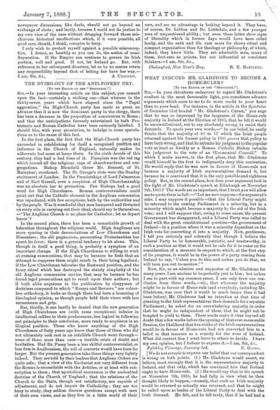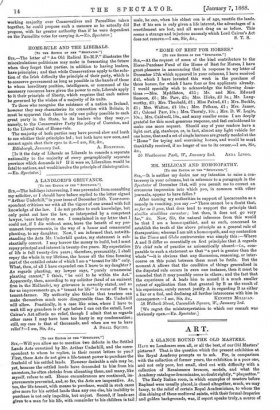WHIT INDUCED MR. GLADSTONE TO BECOME A HO ME-RULE R
?
[To THE EDITOR OF THE " SPECTATOR."] SIR,—In your chivalrous endeavour to regard Mr. Gladstone's conduct in the most favourable light, you sometimes advance arguments which seem to me to do more credit to your heart than to your head. For instance, in the article in the Spectator of December 31st headed "Mr. Gladstone's Career," you urge that he was so impressed by the largeness of the Home-rule majority in Ireland at the Election of 1885, that he felt it would be unconstitutional, not to say absolutely wrong, to resist their demands. To quote your own words,—" In our belief, he really thinks that the majority of 86 to 17 which the Irish people returned against his former policy in 1885 proves that policy to have been wrong, and that he submits his judgment to the popular vote at least as frankly as a Roman Catholic Bishop submits his judgment to the vote of an (Ecumenical Council." To which I make answer, in the first place, that Mr. Gladstone would himself be the first to indignantly deny this contention. He would reply that he was now in favour of Home-rule not because a majority of Irish representatives demand it, but because he is convinced that it is the only possible and righteous policy. But, in the second place, how does your argument look in the light of Mr. Gladstone's speech at Edinburgh on November 9th, 1885? The words are so important, that I trust you will allow me to quote them in full:—" Let me now suppose—for argument's sake, I may suppose it possible—that the Liberal Party might be returned to the coming Parliament in a minority, but in a minority which might become a majority by the aid of the Irish vote ; and I will suppose that, owing to some cause, the present Government has disappeared, and a Liberal Party was called to deal with the great constitutional question—the government of Ireland—in a position where it was a minority dependent on the Irish vote for converting it into a majority. Now, gentlemen, I tell you seriously and solemnly that though I believe the Liberal Party to be honourable, patriotic, and trustworthy, in such a position as that it would not be safe for it to enter on the consideration of a measure in respect to which, at the first step of its progress, it would be in the power of a party coming from Ireland to say, Unless you do this and unless you do that, we will turn you out to-morrow.'"
Now, Sir, as an admirer and supporter of Mr. Gladstone for many years, I am anxious to be perfectly just to him ; but unless I am to part with my common-sense, I can only draw one con- clusion from these words,—viz., that whatever the majority might be in favour of Home-rule (and everybody, including Mr. Gladstone, was sure that it would be much larger than it had
been before), Mr. Gladstone had no intention at that time of granting to the Irish representatives their demands for a separate Parliament ; he asked for an overwhelming majority in order that he might be independent of them, that he might not be tempted to yield to them. These words make it clear beyond all doubt that a few weeks before the opening of that ever-memorable Session, the likelihood that five-sixths of the Irish representatives would be in favour of Home-rule had not converted him to a belief in that measure as a remedy for the woes of Ireland. What did convert him I must leave to others to decide. I have my own opinion, but I forbear to express it.—I am, Sir, &c..
Pylchley Vicarage, January 3rd. E. GATES.
[We do not scruple to express our belief that our correspondent
is wrong on both points. (1.) Mr. Gladstone would assert, we believe, most strongly that it is the representative majority in Ireland, and that only, which has convinced him that Ireland ought to have Home-rule. (2.) He would say that in his speech on November 9th, 1885, he had fully in view what he then thought likely to happen,—namely, that such an Irish majority would be returned as actually was returned, and that he might be called upon as leader of the Liberal Party to deal with the Irish demand. He felt, and he felt truly, that if he had had a working majority over Conservatives and Parnellites taken together, he could propose such a measure as he actually did propose, with far greater authority than if he were dependent on the Parnellite votes for carrying it.—ED. Spectator.]























































 Previous page
Previous page